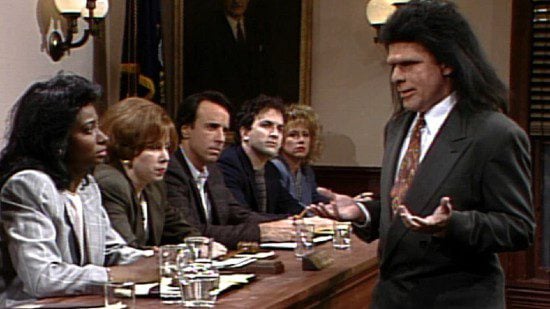Andrew C. writes with a good question:
How do you explain the seemingly barbaric actions of God in the Old Testament? God outright ordered genocides, wars and brutal punishments upon his own followers.
Not just a good question, but a canonical one. A question asked, in fact, by many people right there in the Hebrew scriptures.
The author of Jonah thought this question was so important that he (or she) sat down and wrote the book of Jonah. That book is a relentless attack on the idea that God really is the sort of God who would order genocides, wars and brutal punishments. The book is a brutal satire of such an opinion of the character of God. And it gives God the final word on the matter:
"Should I not be concerned about Ninevah, that great city, in which there are more than 120,000 persons who do not know their right hand from their left, and also many animals?"
As punchlines go, that one's a knockout. This is God Almighty expressing displeasure that anyone would consider God capable of desiring the destruction of a great city, of innocent people or innocent beasts.
And that's where the story ends. Jonah gives no answer because the author of Jonah doesn't think there is any answer to be given.
This isn't a subtle or sideways point the author is making here. It's a direct, explicit challenge — a rebuttal — to those other parts of scripture that portray exactly this sort of God, the very parts of scripture Andrew is objecting to as well. You know the sort of thing, where someone like Jonah says that God has declared some great city or another irredeemable and has commanded it to be destroyed utterly, every man, woman and child and every beast within its walls.
Nonsense, the author of Jonah says. God is not the sort of God who would ever command any such thing and anyone who says otherwise is a bitter, disobedient fool. And the author of Jonah then sketches for us a portrait of just such a bitter, disobedient fool.
It's a vicious, ugly picture. The author of Jonah isn't interested in fighting fair or in conveying any sympathy for the straw-man embodiment of the nonsense he's railing against. Jonah is, without fail, disobedient, stupid and wrong — wrong at every turn. He is portrayed this way because the author of Jonah isn't just trying to raise some doubts about the view he's criticizing, he wants to demolish it, to render it unthinkable.
From start to finish, the author of Jonah is railing against Jonah-ism. There's nothing subtle about this. What we've got here is a good old-fashioned diatribe. And it's a canonical diatribe. This is holy scripture here. The word of God.
The difficulty, though, is that so are all those passages of scripture that the author of Jonah is mocking and ridiculing. The book of Jonah's anti-Jonah-ism is canonical, but so is the Jonah-ism the story condemns. Both are scripture.
This is what freaks out many of my fellow evangelical Christians. It seems to violate what they call the unity of the scriptures — the idea that the Bible cannot and does not ever contradict itself.
That view is hard to square with the book of Jonah. It's hard to square with the fact of the book of Jonah, with its very existence. The book is a polemic, and we can't have a polemic without also having two poles — two contrasting and opposing points of view. The author of Jonah takes sides. Whatever else that means, it demonstrates that there are sides to be taken. It means that there is more than one side, more than one identical view.
It shouldn't be surprising that the Bible contains more than one identical view. This is an anthology of 66 books by a host of different authors, written over a span of many centuries. That all of those authors and all of those books do not present lockstep unanimity doesn't mean we're being presented with contradictions so much as that we're given an ongoing conversation — one that includes and encompasses many points of view, some of which disagree, sometimes vehemently.
This multiplicity of perspectives isn't only something that can be found between books written centuries apart as in the debate between the book of Jonah and the book of Joshua. It can be also found within a single book, a single chapter, a single verse. Even within a single word.
The 15th chapter of the book of Acts describes a gathering of the early Christians in Jerusalem, during which the Apostle James reads from the prophet Amos:
"I will rebuild the dwelling of David … so that all other peoples may seek the Lord …"
That's how Acts 15:16-17 quotes Amos. But keep your finger there and flip back to the book of Amos itself, to the same passage — Amos 9:11-12. If you're using any of our English translations, you'll read something rather different there:
"I will raise up the booth of David … in order that they may possess the remnant of Edom."
Here's the fun thing about biblical Hebrew: no vowels. Plug in one set of vowels and you get "Adam," which means "humankind," giving us a passage that supports James' claim that God's people are to include the "remnant of humankind" — "all other peoples."
Plug in a different set of vowels and you get "Edom," which means Esau and his descendants, an ancient enemy born of the brother who was denied God's blessing. That gives us a passage saying that those people — those Edomites and Ninevites — deserve to be destroyed so that God's own righteous people, the exclusively blessed, can reap the spoils of "the remnant of Edom."
Those two readings are opposites — parallel opposites of the polar opposites we find in the book of Jonah. Maybe James was reading from a different version of Amos than the one our Bibles have. Or maybe he was reading from a text without vowels and unknowingly supplied the "wrong" meaning. Or maybe he had the right meaning and our book of Amos has it wrong. Or maybe he was engaged in a deliberate act of revisionism. I don't know.
What matters here, with regard to Andrew's question, is that we have both meanings, both views, both perspectives, in the Bible we Christians read. Both are a part of our canon. And given these two opposing perspectives we must, like the author of the book of Jonah, choose one. We have to take sides.
We can choose the exclusive vision of Jonah-ism, the view that says we alone are blessed and the rest of the world can go to Hell. Or we can choose the expansive, inclusive vision of the book of Jonah, the view that sees God as madly in love with the great city of Ninevah and indignant at the suggestion that there could be any such city, any person or beast, beyond the scope of that love.












